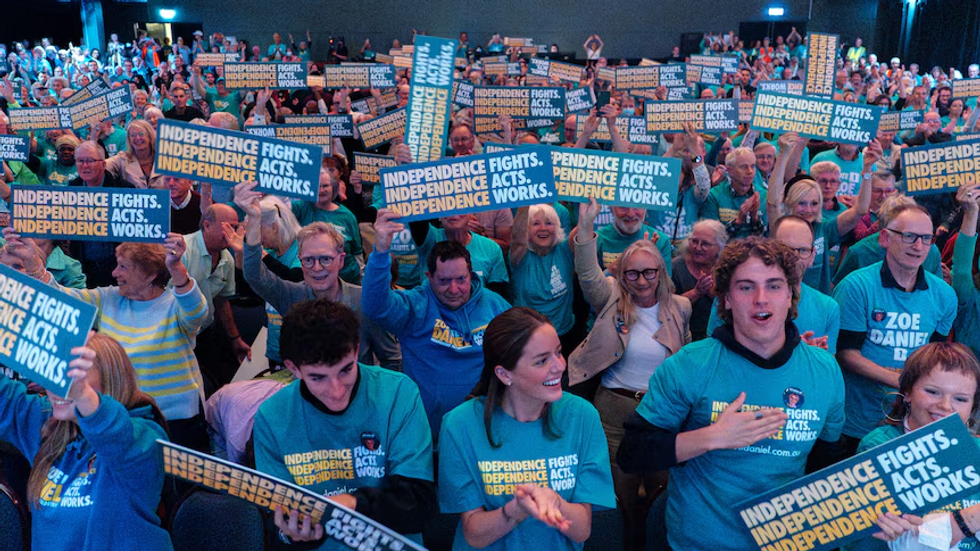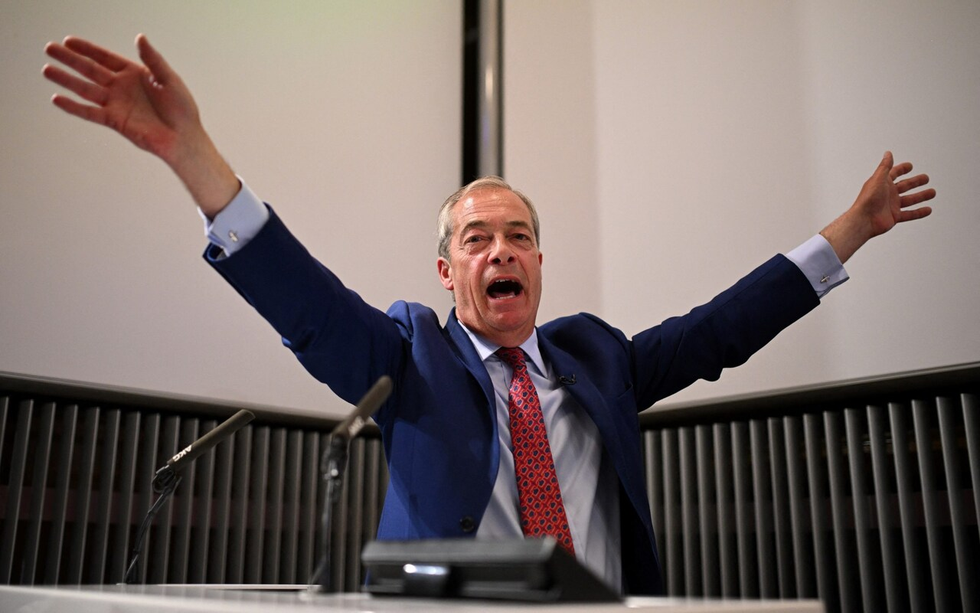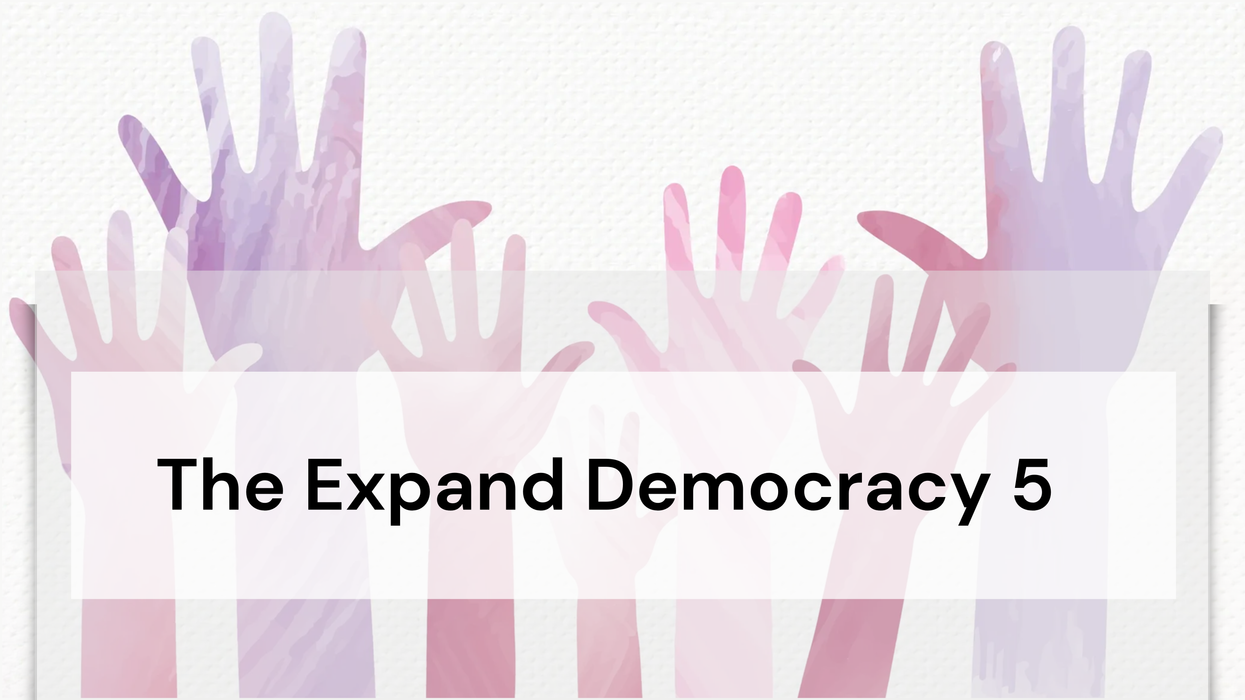Welcome to the newest edition of The Expand Democracy 5! With Rob Richie’s help (from his journey along the Appalachian Trail!), Eveline Dowling explores: (1) parties and polarization in elections in the UK and Australia; (2) open primaries in the United States; (3) bipartisan views on environmental issues; (4) addressing the voting needs of military families; and (5) this week’s timely links.
In keeping with The Fulcrum’s mission to share ideas that help to repair our democracy and make it live and work in our everyday lives, we intend to publish The Expand Democracy 5 in The Fulcrum each Friday.
If you want to suggest a pro-democracy idea for coverage in The Expand Democracy 5, please use the contact form at Expand Democracy.

Deep Dive - Third Parties, Polarization, and the Systems that Shape Democracy 🎬
Australia and the UK recently delivered strikingly different lessons on how electoral systems handle disruption from outside the two-party mold. Both saw surges from non-major parties, but only one appears structurally ready for it. Although the United States has yet to experience such a surge, rising levels of unaffiliated voters and signs of voter disenchantment with their choices make it wise for policymakers to prepare for what may be coming.
Australia’s electoral system welcomes competition
Australia’s recent federal election results offer a compelling case study in how ranked choice voting (RCV), used in the House of Representatives via instant runoff, can empower political independents and elevate voter choice. For decades, Australia has had large numbers of candidates without concerns with “spoilers.” The major parties have generally won nearly all the seats, partly because they had to evolve their positions to compete for the support of minor parties as that support grew – that is, they have been “big tents.” (Its less powerful Senate has proportional representation, contrasting with the situation in which generally no party wins a majority of seats on its own own).
At the same time, RCV has started to make previously assumed “safe seats” competitive. In 2022, several high-profile “ teal independents ” (mostly professional women campaigning on climate action, political integrity, and gender equality) unseated incumbents from the center-right Liberal Party in affluent urban districts. In fact, the vote for independents increased from 5.3% in 2022 to more than 7% this year. However, the shifting tides create a fascinating dynamic. Key wins include:
- Allegra Spender in Wentworth (Sydney)
- Monique Ryan in Kooyong (Melbourne), defeating then Treasurer Josh Frydenberg
- Zali Steggall retained her seat in Warringah (Sydney)
- Sophie Scamps in Mackellar (Sydney)
These victories resulted from RCV’s ability to secure majority support without tactical voting. Many independents won after trailing in first-choice votes, gaining vital second and third-choice rankings from Greens and Labor voters. In 2025, the teals largely maintained their position but made few new gains as major parties are learning how to compete for their votes.
The results show how an electoral system designed to reflect true voter preferences in each district can hold traditional party power accountable and open the door to new, community-backed leadership. In sum, RCV ensures that even when voters turn away from major parties, as they did by electing several “teal independents” and Greens to Parliament, votes aren’t “wasted”, and the major parties are encouraged to evolve. Candidates must earn a majority through preference flows, meaning major parties must adapt their platforms to build broader coalitions. The result is a dynamic yet stable democracy, where diverse voices have influence, but extremist parties struggle to leapfrog into power.
 Asanka Ratnayake / Getty Images
Asanka Ratnayake / Getty Images
UK: When polarization meets FPTP
While Australia's RCV system has facilitated the rise of independents by allowing voters to rank preferences, the UK's recent elections underscore the constraints of the first-past-the-post (FPTP) system. Last year, the Labour Party won nearly two-thirds of seats with only 33.7% of the vote - even as five parties earned double-digit support nationally, and 13 parties won at least one seat. Hundreds of seats were won with far less than half the vote.
This month, Reform UK, a right-wing populist party led by Nigel Farage, secured its fifth parliamentary seat in the Runcorn and Helsby by-election, earning 38% to replace a Labour MP. Despite garnering over 14.3% of the national vote in the 2024 general election, Reform UK obtained only five seats, highlighting the disproportionality inherent in FPTP.
This disparity has intensified calls for electoral reform in the UK. Like other leaders of the smaller parties, Farage has advocated for a transition to a proportional representation system, But while the simple plurality system often marginalizes smaller parties, Labour’s landslide win with 33% shows that a much more extreme Party like Reform UK could seize power in a system that is vulnerable to populist backlash and declining legitimacy when growing segments of the electorate feel unheard.
 Nigel Farage, Reform UK leader and new MP for Clacton The Telegraph
Nigel Farage, Reform UK leader and new MP for Clacton The Telegraph
What does this mean for the US?
The contrast between Australia's RCV and the UK's plurality systems illustrates how electoral frameworks can significantly influence political outcomes and representation. As discussions around electoral reform continue, examining international models like RCV offers valuable insights into creating a more representative democratic process.
These contrasting case studies offer a glimpse into two possible futures. In Australia, a robust electoral design helps absorb political change without breaking the system. In the UK, electoral rigidity risks intensifying division. With increasing third-party sentiment in the US, where a majority of voters identify as independents (51%) according to Gallup, we must question our political system's readiness.
RCV, now spreading in US cities and states, may offer a democratic pressure valve. Australia shows it can work, and the UK warns about what happens when change is blocked. Which path will we choose?
Resources:
- An introductory and informative video on how RCV operates from Rank the Vote
- FairVote discusses the effects that RCV has on representation and polarization in Australia

Open Primaries in the US
The possible fragmentation of plurality voting in the United Kingdom may not appear imminent in the United States; however, indications are evident through the significant decline in the number of voters registering with the major parties. This trend is closely tied to discussions on how to ensure that these voters feel connected to politics. Allowing independent voters to participate in primaries gives them an opportunity to cast meaningful votes and become more invested in their choices during the general election.
In the current U.S. political landscape, characterized by heightened polarization and a growing number of independent voters, the structure of primary elections plays a pivotal role in shaping democratic representation. Recent analyses indicate that open and nonpartisan primaries can lead to higher voter turnout and a more representative electorate compared to closed primaries.
Joshua Ferrer's 2024 paper, The Effect of Partisan Primaries on Turnout and Representation, utilizes a comprehensive dataset to assess how opening primaries to unaffiliated voters impacts voter turnout and the representativeness of the electorate. The study employs a difference-in-differences design, analyzing nearly a decade of nationwide voter file data alongside original panel data on state primary rules. This methodological approach allows for a robust examination of the causal effects of primary participation rules on electoral outcomes. Results show that these reforms lead to a more demographically representative electorate, particularly enhancing participation among unaffiliated voters and communities of color.
In addition, Ferrer demonstrates that states implementing open primaries experience a five percentage point increase in voter turnout. This supports research from Unite America indicating that open primaries may result in higher participation. States with nonpartisan primaries, such as Alaska and Washington, have observed significant increases in primary turnout, with rates of 37% and 35%, respectively, compared to the national average of 21%. This research provides empirical support for the argument that open primary systems can mitigate disparities in political participation and promote a more inclusive democratic process.
As the U.S. nears the 2026 midterms, the conversation surrounding primary election reforms is intensifying, particularly regarding the advantages of open primaries in promoting a more inclusive and representative democracy.
Resources:
- Unite America reports that, amidst various forces driving polarization and dysfunction, the partisan primaries represent the most significant and solvable issue.
- Open Primaries is the premier source for information about primaries in the US and is nationally recognized for expertise in this area.
- RepresentUs offers an excellent primer explaining how open primaries could change American politics.

More in Common Finds Americans Are More United on the Environment Than They Think
A new report from More in Common reveals a surprising truth: Americans across party lines are far more aligned on environmental values than the national debate suggests. The study shows that 88% of Americans, Democrats, Republicans, and Independents alike, support protecting public lands, and 76% support government action on pollution.
Even more striking, 83% believe the U.S. should lead the world in developing clean energy, yet many Americans severely underestimate how widely this belief is shared, especially across the aisle. These misperceptions may be stalling bipartisan progress on climate policy.
While differences remain on the urgency of action, the report highlights a strong shared commitment: 82% of Americans agree we should work together to solve climate change, regardless of its causes. This data indicates that our winner-takes-all electoral system is only partially responsive to public opinion. As not enough voters prioritize environmental issues when choosing candidates, we have ended up with a government that holds positions starkly opposed to public support. It’s a reminder that reframing climate around shared values, like leadership, can be a powerful tool for bridging divides.

Military Families and Supporting the Voting Needs of Those Who Move Frequently ⚡
When we talk about improving voting access, it’s crucial to consider what the most transitory Americans face - because their challenges often illuminate what’s broken for everyone else. Military families, who frequently relocate across states and even overseas, are a "canary in the coal mine" for the voting system. Their experience navigating voter registration, absentee voting, and participation in local elections shows us where reforms are most urgently needed.
The Military Vote Coalition has emerged as a key voice in spotlighting these barriers and advocating for a set of commonsense, nonpartisan reforms designed to make voting more accessible and secure for service members and their families. Their recommendations aim to make U.S. elections more "military-friendly" and, by extension, more voter-friendly overall. Below are their policy priorities for “military-friendly” voting:
“ We affirm that the “gold standard” for the amount of time after Election Day when absentee ballots should still be able to arrive and be counted is 7 days.
We affirm that absentee voters across all states should have access to an online form of ballot tracking where they can check whether their ballot arrived and were counted.
We affirm that absentee voters across all states should be proactively notified if their ballot has been rejected, and have access to a robust ballot-curing process with ample response time.
We affirm that military-issued identification cards should always be included in the list of acceptable IDs for any voter registration, in-person voting, or absentee voting policy that requires photo ID.
We affirm that uniformed service members and dependents should receive information about voter registration at multiple checkpoints throughout their Permanent Change of Station (PCS) process, and in methods informed by user design.
We affirm that the dependents of uniformed service members should have a pathway to poll working, even if they are not locally-registered voters.”
By designing voting systems that work well for military families, we take a step toward building a voting system that works for all Americans, no matter where they live or how often they move.
 thefulcrum.us
thefulcrum.us
Timely Links
We close The Expand Democracy 5 with notable links:
- Boston City Council Passes Ranked-Choice Voting Proposal: The Boston City Council voted 8-4 to advance a proposal to adopt ranked-choice voting for city elections. The measure now heads to Mayor Michelle Wu, the state legislature, and potentially Boston voters. If fully approved, RCV could be implemented as early as 2028.
- WSJ Op-Ed: Reviving Secure Voting Through a Modernized Public Fund: A recent Wall Street Journal opinion piece argues for revitalizing the outdated Presidential Election Campaign Fund by allowing taxpayers to allocate $3 toward election security and infrastructure improvements. The proposal suggests this approach could enhance trust in elections by providing transparent, voter-directed funding for secure voting systems.
- “You Need Conservatives. Here’s How to Engage Them in Your Mission”: A new piece in the Chronicle of Philanthropy argues that the social sector cannot achieve its full potential without meaningfully engaging conservatives, who are often underrepresented and mistrustful of progressive-led initiatives. Written by Pearce Godwin, a conservative with political and philanthropic experience, encourages nonprofits to lead with humility, focus on shared goals, and adapt their language to resonate with conservative values like family, faith, patriotism, and community. The article presents strategies to build trust, co-create solutions, and bridge ideological divides for greater impact.
- “A Long-Term Perspective Shows Major Successes, and Opportunities Ahead”: Despite popular sentiment, the Election Reformers Network compiled a report highlighting the substantial and measurable advancements made in the U.S. democratic infrastructure over the last 25 years. From 2000 to 2025, adoption of key reforms, like independent redistricting commissions, ranked choice voting, no-excuse vote by mail, automatic voter registration, and verifiable paper trails, has expanded across dozens of states, often with bipartisan support. This long-term view highlights that while challenges remain, momentum for improving election fairness, accessibility, and accountability is real.
- "Call for Innovative Election Administration Funding Solutions”: Auburn University, in collaboration with the Election Center, has issued a call for entries to find innovative and practical solutions to address the critical issue of adequate funding for election administration at the local, state, and federal levels across the United States. Participants are invited to submit original proposals that explore new and sustainable methods for financing election administration, considering the unique structure and functions of election offices among government departments and agencies. The challenge encourages creative thinking and collaboration in developing new approaches to election funding.





















